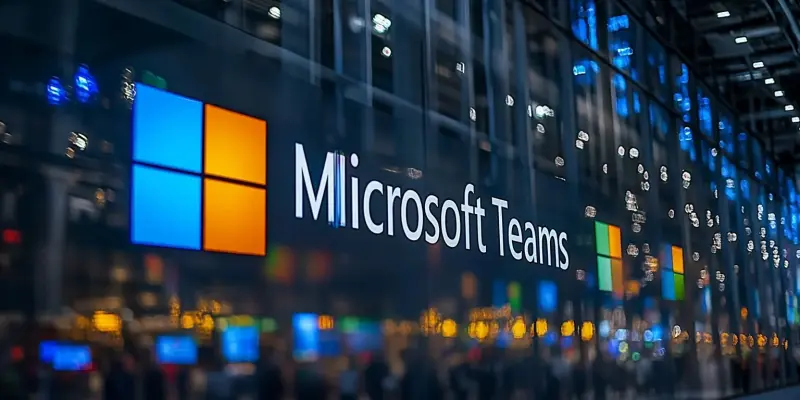In a new twist to the evolving landscape of cyber threats, the DarkGate remote access Trojan (RAT) has devised yet another stealthy method to compromise systems, leveraging the ubiquitous Microsoft Teams platform. Long recognized for infiltrating via phishing emails, malvertising, and compromised messaging apps, DarkGate’s latest tactic employs a voice phishing, or vishing, technique. This novel attack vector was recently brought to light by security researchers at Trend Micro, who detailed how the RAT is now invading corporate systems through seemingly innocuous Microsoft Teams calls, adding another layer of sophistication to its distribution tactics.
The revelation marks a significant evolution in the modus operandi of DarkGate, a multipurpose and sophisticated malware. The attack begins with a Teams call from an entity masquerading as an external supplier requiring technical support. Here, social engineering plays a pivotal role, as the attacker attempts to persuade the victim to install remote support software. When the initial attempt fails, the cybercriminals adapt swiftly, directing the victim to install AnyDesk, a legitimate remote access tool, which then serves as a conduit for downloading malicious scripts, including DarkGate RAT, onto the victim’s machine.
Identifying the Vishing Attack
The vishing attacks tied to DarkGate are initiated with a barrage of phishing attempts, laying the groundwork for the subsequent voice call. Once the victim is engaged, the attacker, posing as a tech support representative, leverages the trust typically placed in technical support roles to instigate the installation of software. This initial phase is critical because it exemplifies one of the core principles of social engineering: establishing credibility. The attacker’s use of Microsoft Teams, a platform trusted by many corporations for internal and external communications, further aids in the success of the ruse.
Once the attacker convinces the victim to install AnyDesk, they establish a remote session, providing them with unfettered access to the target system. Following this, the installation of malicious scripts begins, driven by automated tools like AutoIt. These scripts set up a connection to a command-and-control (C2) server, which facilitates the download of numerous malicious files to the compromised system. This connectivity allows the attacker full remote control, enabling them to execute commands, gather system information, and maintain ongoing connections to the C2 server, thereby establishing a firm foothold within the victim’s network.
Capabilities and Threats of DarkGate RAT
DarkGate RAT’s capabilities are both extensive and destructive, attesting to its resilience and versatility since its first appearance in 2017. This RAT enables a wide range of malicious activities, from gathering detailed system information and mapping networks to accessing and manipulating Remote Desktop Protocol (RDP) sessions. DarkGate also excels in supporting less conspicuous operations such as hidden virtual network computing, showcasing its ability to exploit remote access tools like AnyDesk to their fullest potential. The malware is even equipped for cryptocurrency mining, a resource-intensive activity that can significantly degrade system performance and disrupt normal operations.
Moreover, DarkGate is proficient in keylogging, escalating user privileges, and pilfering information stored in web browsers, all while remaining stealthy enough to evade detection. The RAT’s adaptability is further underscored by its capacity to deploy additional malware, such as another RAT known as Remcos. This extensive toolkit enables it to extend its control over compromised systems, laying the groundwork for more complex and sustained cyber attacks. The RAT’s multifaceted threat profile requires organizations to adopt comprehensive security strategies to effectively counteract its numerous capabilities.
Enhancing Defensive Measures Against Vishing
To counter the increasing sophistication of vishing attacks employed for distributing DarkGate RAT, organizations must go beyond conventional security measures. Enhanced training programs aimed at recognizing and countering social engineering tactics are paramount. Employees should be educated on the latest phishing methods and taught to recognize red flags that might indicate a potential attack. Regular drills and simulated phishing attacks can bolster this awareness, helping employees to consistently stay vigilant and respond appropriately when confronted with suspicious activities.
Organizations should also continuously vet third-party technical support providers, ensuring their legitimacy before granting them access to corporate systems. This can be achieved through a rigorous validation process that includes background checks and verifying the credibility of the supplier. Furthermore, enforcing strict cloud-vetting processes for remote access tools, and adopting measures such as application whitelisting and multifactor authentication (MFA), can provide an additional layer of security. These proactive steps can significantly reduce the risk of unauthorized access and the subsequent exploitation of systems by malicious actors.
Conclusion
In a new twist in the ever-evolving cyber threat landscape, the DarkGate remote access Trojan (RAT) has found another stealthy way to infiltrate systems by exploiting the widely used Microsoft Teams platform. Previously known for infiltrating via phishing emails, malvertising, and compromised messaging apps, DarkGate’s latest strategy uses a voice phishing, or vishing, technique. This new attack vector was recently exposed by security experts at Trend Micro, who detailed how the RAT is now infiltrating corporate systems through seemingly harmless Microsoft Teams calls, adding another level of sophistication to its distribution methods.
This discovery signifies a major evolution in the methods used by DarkGate, a versatile and advanced malware. The attack starts with a Teams call from an entity pretending to be an external supplier in need of technical support. Essentially, the attacker leverages social engineering to convince the victim to install remote support software. If the initial attempt fails, the cybercriminals adapt swiftly, directing the victim to install AnyDesk, a legitimate remote access tool, which then serves as a conduit for downloading malicious scripts, including DarkGate RAT, onto the victim’s machine.

